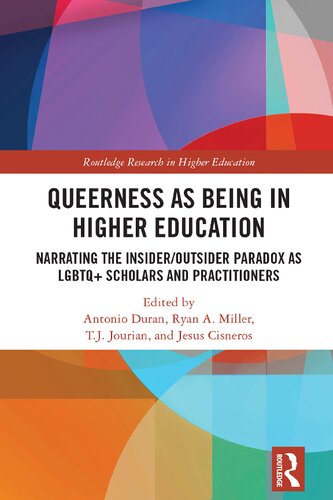

Most ebook files are in PDF format, so you can easily read them using various software such as Foxit Reader or directly on the Google Chrome browser.
Some ebook files are released by publishers in other formats such as .awz, .mobi, .epub, .fb2, etc. You may need to install specific software to read these formats on mobile/PC, such as Calibre.
Please read the tutorial at this link: https://ebookbell.com/faq
We offer FREE conversion to the popular formats you request; however, this may take some time. Therefore, right after payment, please email us, and we will try to provide the service as quickly as possible.
For some exceptional file formats or broken links (if any), please refrain from opening any disputes. Instead, email us first, and we will try to assist within a maximum of 6 hours.
EbookBell Team

4.3
18 reviewsGuided by the scholarly personal narratives of LGBTQ+ higher education scholars, practitioners, and scholar-practitioners, this informative volume explores how individuals exist within and experience the insider/outsider paradox within higher education as they engage in disruption, queer methods, and action.
The second of a two-volume series, this book relates to the firsthand accounts and personal stories of the contributors in order to illustrate the challenges and opportunities that exist for queer and trans people. Framed through the concept of queerness as doing, this book takes up the important question of what it means to occupy both positions of oppression and degrees of privilege within society and in the context of work. It discusses how stories depict the nuances of the insider/outsider paradox relative to practicing queerness as a politic while identifying as part of the LGBTQ+ community in higher education settings. The book then looks to the future, discussing implications for research and practice, using the lessons learned from the chapter authors.
Comprised of firsthand contributions and innovative scholarship, this book will be of interest to students and scholars of queer and trans studies, student affairs, gender and sexuality studies, and higher education, as well as those seeking to understand the experiences of LGBTQ+ scholars and practitioners as they navigate central tensions in their scholarship and practice.